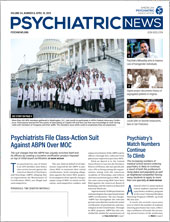In March, the Food and Drug Administration (FDA) approved Sage Therapeutics’ Zulresso (brexanolone) for the treatment of postpartum depression (PPD), making it the first medication specifically approved for what can be a life-threatening condition.
This breakthrough represents the culmination of a long journey that began in the 1940s, when it was first discovered that some steroid hormones had neurological properties like sedation. Over the decades since, countless hours of basic, translational, and clinical research have gone into not only further studies on how steroids work in the brain, but also studies that characterized PPD and showed that it might be a unique depressive disorder that requires a
different treatment strategy.
Zulresso will be available only through a restricted program called the Zulresso REMS Program. Patients must be enrolled in the program prior to treatment with the medication. Only health care professionals in a certified health care facility may administer Zulresso.
Zulresso is given as a continuous intravenous infusion over a total of 60 hours (2.5 days). Patients must be monitored for potential side effects including excessive sedation or sudden loss of consciousness. They also must be accompanied by a caregiver or family member to assist them with child care during the infusion. Patients should not drive, operate machinery, or do other dangerous activities until feelings of sleepiness from the treatment have completely gone away.
These requirements are addressed in a black-box warning about which patients must be counseled prior to treatment.
“Brexanolone is really unlike anything we have seen before,” said Samantha Meltzer-Brody, M.D., M.P.H., director of the Perinatal Psychiatry Program at the University of North Carolina. She was the lead academic investigator for the brexanolone clinical trials.
Whereas traditional depression medications principally target the neurotransmitters serotonin and dopamine, brexanolone targets gamma-Aminobutyric acid, or GABA.
During pregnancy, GABA receptors in the brain are downregulated, though their levels increase after childbirth. If this upregulation doesn’t occur, it may lead to PPD. Brexanolone, which is an intravenous formulation of the hormone allopregnanolone, boosts the activity of GABA receptors.
“This is a big moment in psychiatry,” said Mi Hillefors, M.D., Ph.D., chief of the Translational Therapeutics Program at the National Institute of Mental Health (NIMH). “There had been this long pause without any truly new mood disorder drugs, and now we have two this year.” (Two weeks prior to brexanolone’s approval, the FDA
approved esketamine for treatment-resistant depression.)
Hillefors told Psychiatric News that NIMH, including Director Joshua Gordon, M.D., Ph.D., is especially excited about brexanolone’s approval since much of the seminal basic science was conducted at NIMH in the 1980s and 1990s by researchers such as Steven Paul, M.D. (who would go on to co-found Sage, the drug’s manufacturer). These studies demonstrated how allopregnanolone modulated GABA receptors as well as how levels of the hormone fluctuate during periods of female stress—notably the menstrual cycle and pregnancy.
The advantage of brexanolone is that the stimulating effects happen quickly; mood can improve within 24 hours, not the six to eight weeks it takes traditional oral antidepressants to reach maximum effect. As Meltzer-Brody explained, this rapid onset is important, as a delayed response adversely impacts a mother’s ability to properly care for her infant.
“Beyond the rapid onset of action, this medication approval is important in that it clearly establishes that postpartum depression is a medical illness,” Meltzer-Brody continued. She noted that many new mothers still encounter stigma related to depression or misperceptions that this disorder may not be real.
The projected cost of the medication is $34,000 per session, which many fear could limit access. Meltzer-Brody, who is not involved in any of the commercialization of Zulresso, acknowledged that price is a potential barrier, but noted that other factors need to be factored into the treatment equation. They include the cost of missing work for several months and need for hospitalization as well as the potential for self-harm and harm to the baby.
“First, this medication should be given only to women whose depression is severe enough that it significantly impairs their ability to care for a child,” she said. “For women with milder symptoms, traditional antidepressants or psychotherapy are still the preferred choice.”
While long-term studies with brexanolone are being conducted, data indicate that one infusion improves mood for at least 30 days. If effects can be sustained and a woman needs only one or two infusions a year, then the costs could be manageable. Another possibility is that after an initial course of brexanolone, a woman can switch to oral antidepressants as maintenance therapy.
As Meltzer-Brody had previously said to Psychiatric News, the women most likely to use and benefit from brexanolone have severe and chronic PPD symptoms that don’t respond well to current therapies. “Now we have a new option that, yes, has some costs and side effects that have to be considered seriously,” she said. “But it may also completely resolve depression symptoms within one day. I think most women would take that chance.”
“We still have to learn more about the biology of brexanolone, and the FDA is rightly asking that more data be collected,” Hillefors said. “But this is an important step forward in treating women at a critical stage in their life. It also signals that there are definitely novel treatments for mental illness waiting to be discovered.” ■
Zulpresso is expected to be available in late June. The FDA press release announcing Zulpresso’s approval can be accessed
here.

